Recycling of the former RFA Black Rover and Gold Rover (accessible version)
Published 16 September 2020
Introduction
The former Black & Gold Rover ceased operational service in 2017 and was deemed no longer fit for further use. The Defence Equipment Sales Authority (DESA) advertised the sale of the ships for Recycling only, requesting expressions of interest from recycling yards within the Organisation for Economic Co-Operation (OECD) and were in full compliance with the principles of the Basel Convention and all other associated EU & UK legislation including Regulation (EU) No 1257/2013 of the European Parliament and of the council of 20 November 2013 on ship recycling and amending Regulation (EC) No 1013/2006 and Directive 2009/16/EC on Shipments of Waste. Once these had been received an Invitation To Tender (ITT) was conducted for the recycling of the former RFA Black & Gold Rover 7th June 2018 and contract awarded to SOK Denizcilik ve Ticaret Ltd STi 31st October 2018.
Transfrontier Shipment of Waste (TFS) was then undertaken as the Recycling yard was outside the UK, approval from the Environmental Agency in the UK and Ministry of Environment and Urbanization in Turkey and received 25th July 2019. Once TFS was approved preparation for towage to Turkey could begin.
Background
The Defence Equipment Sales Authority (DESA) offers an alternative way for customers and international governments to acquire proven capabilities in a cost-effective manner. DESA handles the disposal of all materiel that can generate revenue within the UK and overseas, for example, aircraft, aircraft spares, ships, boats, river craft and other marine vessels and spares, military and domestics vehicles, with the exception of nuclear, domestic waste and infrastructure. It is unique in government, specialising in the sale of surplus equipment. The DESA’s primary aim is to sell surplus ships for further use but where this is not possible (for instance, when a ship is no longer fit for operational use and only suitable for recycling) its objectives are to ensure that the vessel is recycled in a safe and environmentally sound manner, and in compliance with its legal responsibilities as a producer of waste.
The DESA has 4 objectives for its sales activity:
- maximise the receipts for the MOD
- ensure legal and environmental requirements are met
- provide defence engagement opportunities as a result of our sales activity
- provide opportunities for British industry as part of the prosperity agenda.
As an ISO 9001 accredited organisation, the DESA has an established track record of providing high quality, combat proven, military capability direct from the UK defence inventory as a cost-effective alternative to buying new. Being a transparent and trusted department, the DESA looks to develop long term and mutually beneficial relationships with our international partners.
General particulars of the vessels
| Date and Place of Build | |
|---|---|
| RFA Black Rover | October 1973: Swan Hunters Wallsend UK |
| RFA Gold Rover | March 1973: Swan Hunters Wallsend UK |
| Date ceased operational service | |
|---|---|
| RFA Black Rover | 17 March 2017. |
| RFA Gold Rover | 12 May 2017. |
| Type of Vessel |
|---|
| Small Fleet Tanker (AOL) |
| Displacement and weights on Tonnes | |
|---|---|
| RFA Black Rover | Current Displacement: 8129 Gross: 7892 Net: 2367 DWT: 6692 Lightweight: 4901 |
| RFA Gold Rover | Current Displacement: 8808 Gross: 7894 Net: 2367 DWT: 6799 Light: 5089 |
| Draughts | |
|---|---|
| RFA Black Rover | Fwd 4.8m Aft 5.8m |
| RFA Gold Rover | Fwd 4.8m Aft 6.4m |
| Length | |
|---|---|
| RFA Black Rover | OA 140.76m BP 131.06 |
| RFA Gold Rover | OA 140.61m BP 131.06 |
| Beam | |
|---|---|
| RFA Black Rover | 19.23m |
| RAF Gold Rover | 19.23m |
Competition
DESA advertised the sale of the former Black & Gold Rover for Recycling only, in September 2017, as recommended by the UK Ship Recycling Strategy (SRS). Tenders were limited to bidders from within the EU and OECD countries – out of the companies that expressed an interest in tendering only 4 companies were invited to tender.
The information provided to the bidders was to enable them to identify key environmental issues and cost drivers in their tender responses.
DESA secured additional provisions from the bidders in the form of a substantial financial bond, acting as security to ensure that the vessel was recycled in the destination stated and not reflagged and taken to a yard non-compliant or outside the EU or OECD. The vessels were sold on an ‘as seen as lying’ basis for recycling within the EU and Organisation for Economic Co-Operation (OECD). The recycling was to be in full compliance with the principles of the Basel Convention and all other associated EU & UK legislation including Regulation (EU) No 1257/2013 of the European Parliament and of the council of 20 November 2013 on ship recycling and amending Regulation (EC) No 1013/2006 and Directive 2009/16/EC on Shipments of Waste, plus but is not limited to:
-
the Waste Shipments Regulation (EC)
-
No 1257/2013 of the European Parliament and of the council of 20 November 2013
-
parts of the Radioactive Substances Act 1993
-
Environmental Protection (Duty of Care)
-
Regulations 1991 SI 2839
-
Hazardous Waste (England and Wales)
-
Regulations 2005 SI 894
-
Health & Safety at Work etc. 1974
In preparation for the sale of the former Black & Gold Rover for recycling a number of tasks had to be carried out, and these were undertaken by the MOD’s Disposal Reserve Ship Organisation (DRSO) who are based in Portsmouth.
DRSO played a vital role in the preparation of the vessel including assisting the Ship’s Platform Team in the production of the Inventory of Hazardous Materials (IHM) highlighting the hazardous material on board along with an independent Asbestos Management Survey provided by Lucion Environmental Ltd, both of which were included as part of the tender documents. DRSO also played a big part on the day of viewings of the vessels, which included hosting potential bidders, escorting them round the vessel and providing the technical brief and answering any questions that arose.
The activities conducted by DRSO demonstrated to ship owners the value of investing in the preparation of ships for sale which is of enormous benefit to the UK MOD as it continues to set standards for the dismantling of Government owned vessels.
Prior to the planned departure date of the vessels, the purchaser liaised with DRSO to ensure the towing plan was acceptable and assisted the purchaser with contacting the MCA for approval of the tugs responsible for towing the former Black & Gold Rover. DRSO played an essential part in supporting the towing and rigging preparations on deck which contributed to the smooth departure of both vessels.
Ship Recycling Evaluation
Before contract award was made; as per the recommendation of the SRS, DESA convened a Ship Recycling Evaluation Committee, involving representatives from the Maritime Coastal Agency (MCA), DRSO and DESA to assess the tender responses against a set criteria called for in the Strategy.
Prospective purchasers were required to produce a detailed Ship Recycling Plan, demonstrating their understanding of all the requirements involved in Ship Dismantling against each of the following:
- project plans
- operations
- health and safety.
The Ship Recycling Plan was paramount to the consideration of offers to purchase and provided evidence to enable the Evaluation Committee to score against.
Contract Award
DESA awarded the contract for Recycling of the former Black & Gold Rover October 2018 to SÖK Denizcilik ve Ticaret Ltd STI who are based in Turkey
Transfer of title for the former Black Rover took place from MOD Ownership and Naval Base Commander (Portsmouth) custody to SOK Denizcilik ve Ticaret Ltd STI 11TH August 2019.
Transfer of title for the former Gold Rover took place from MOD Ownership and Naval Base Commander (Portsmouth) custody to SOK Denizcilik ve Ticaret Ltd STI 13TH August 2019.
Black Rover
- departed Portsmouth: 11 August 2019
- arrived SÖK Denizcilik ve Ticaret Ltd STI yard in Turkey: 1 September 2019
- completely dismantled on 20 January 2020
Gold Rover
- departed Portsmouth:13 August 2019
- arrived SÖK Denizcilik ve Ticaret Ltd STI yard in Turkey: 3 September 2019
- completely dismantled: 2 December 2019
Photographic evidence
Departure to dismantled
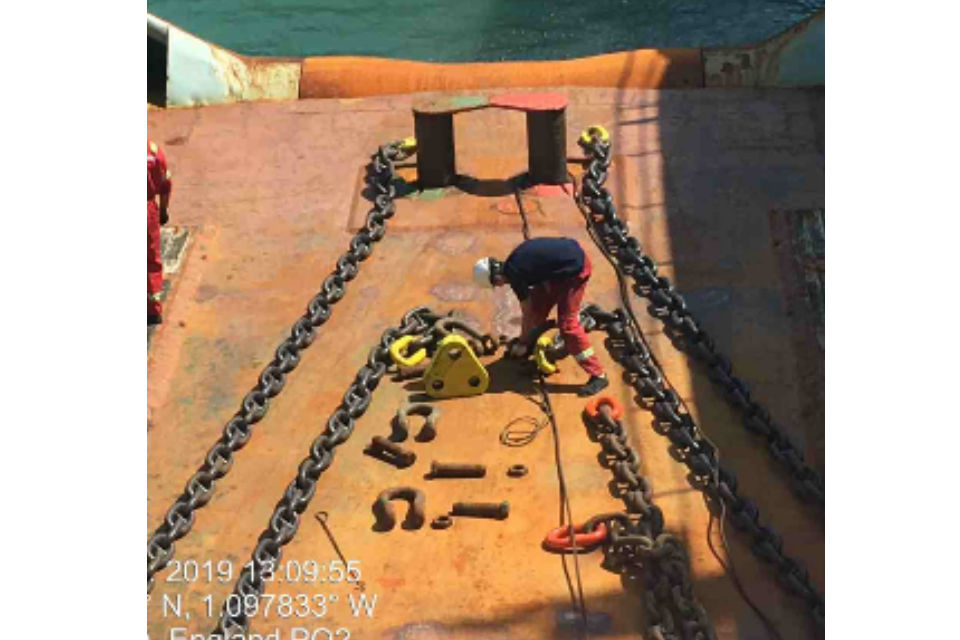
Tugs being prepared for towing. MOD Crown Copyright, all rights reserved.
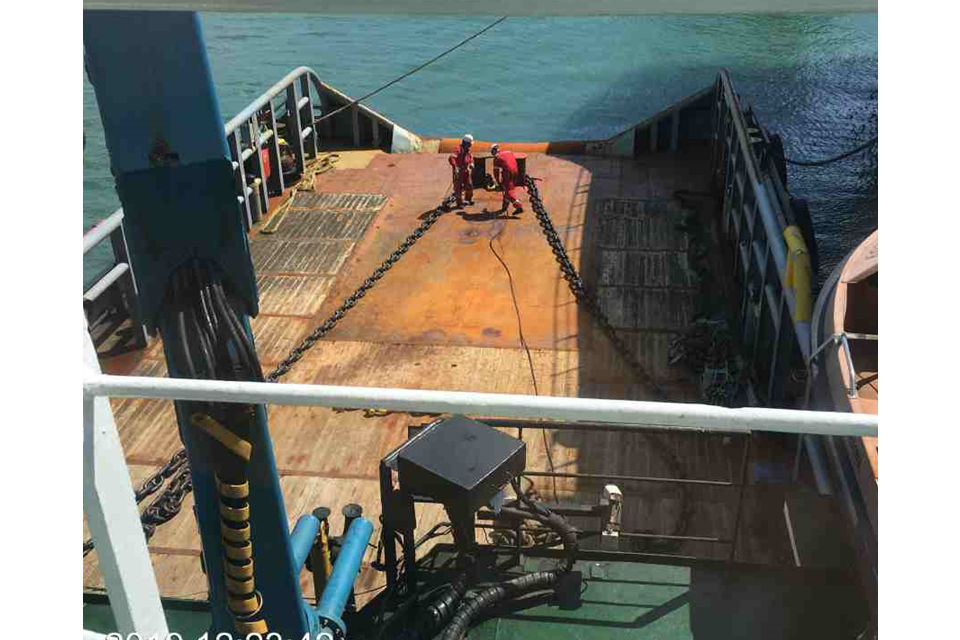
Tugs being prepared for towing. MOD Crown Copyright, all rights reserved.
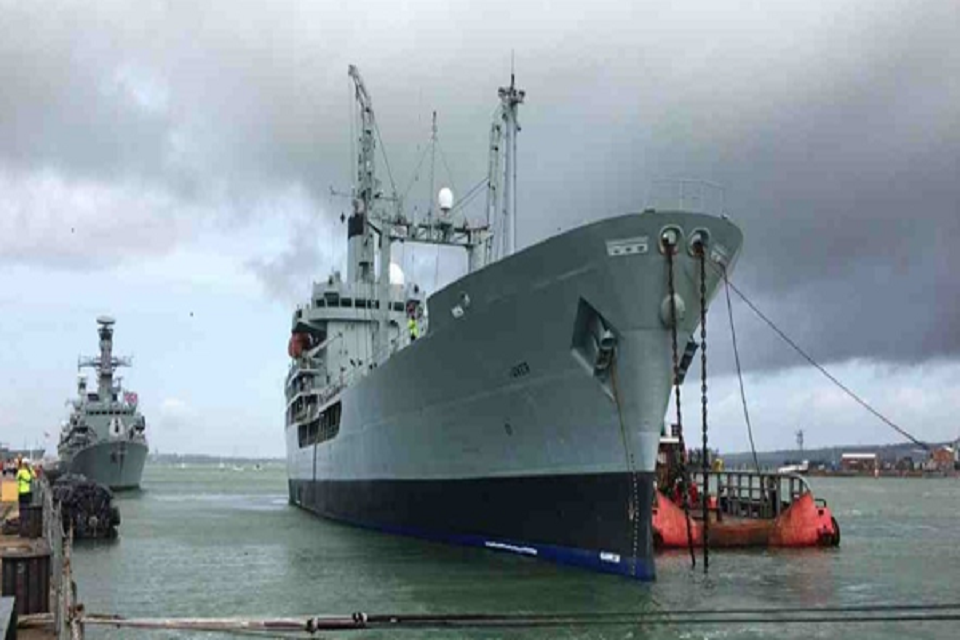
Black Rover being prepared for towing. MOD Crown Copyright, all rights reserved.
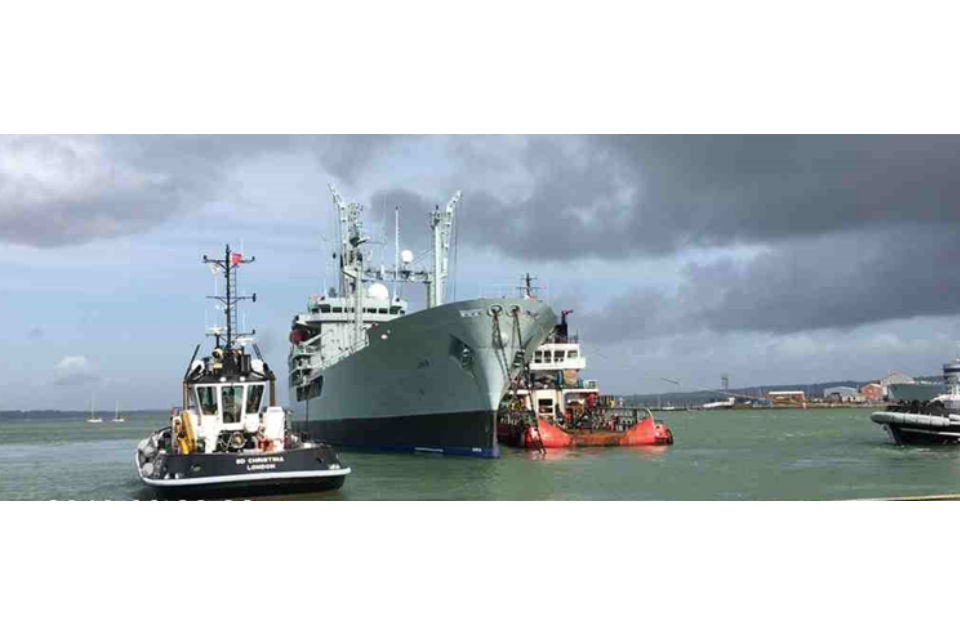
Tugs turning Black Rover. MOD Crown Copyright, all rights reserved.
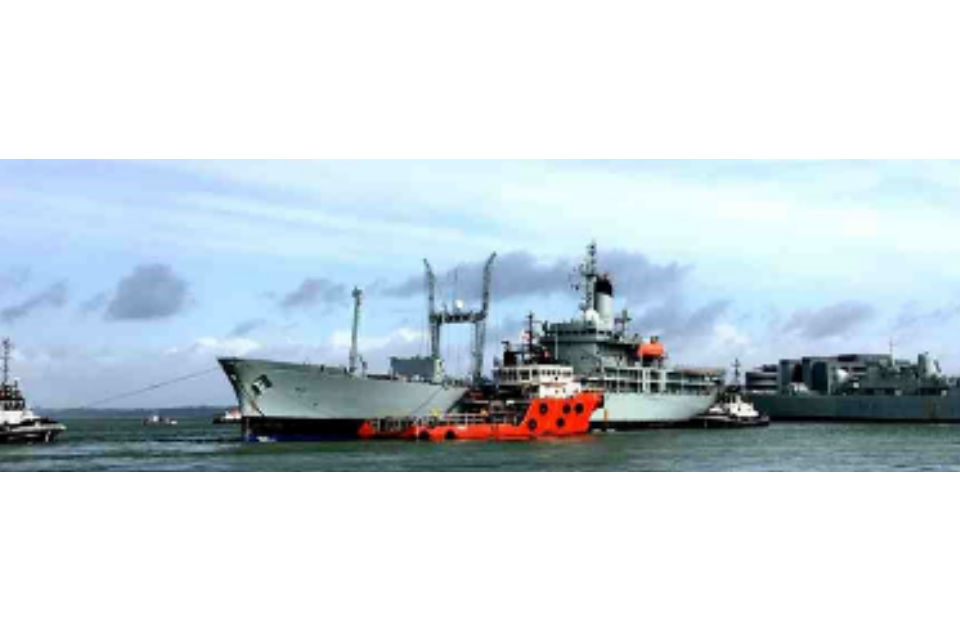
Black Rover departing the Naval Base. MOD Crown Copyright, all rights reserved.
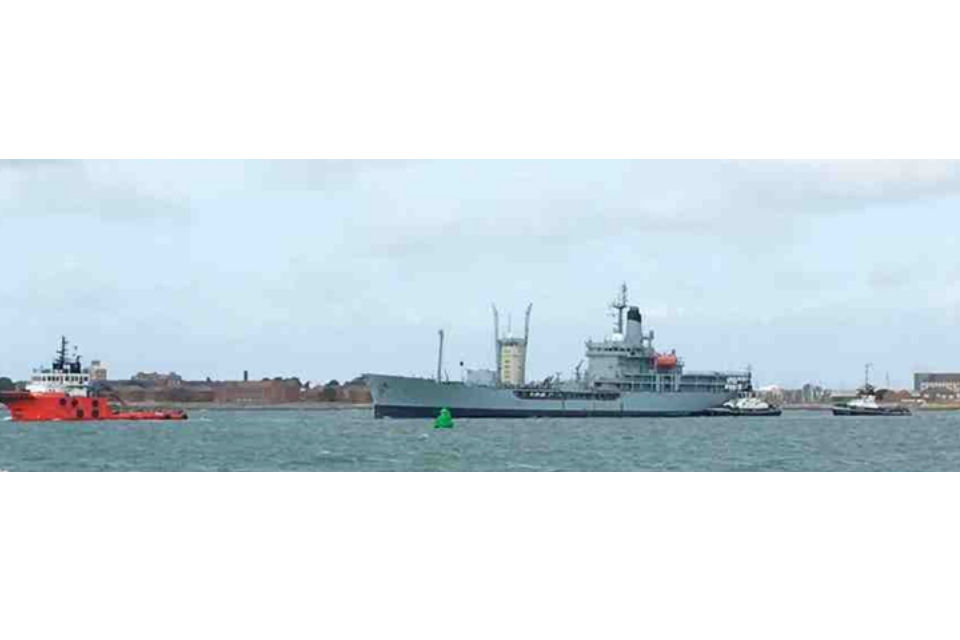
Black Rover's final voyage to the recycling yard.
Arrival of the Former Rover’s at the recycling yard in Turkey
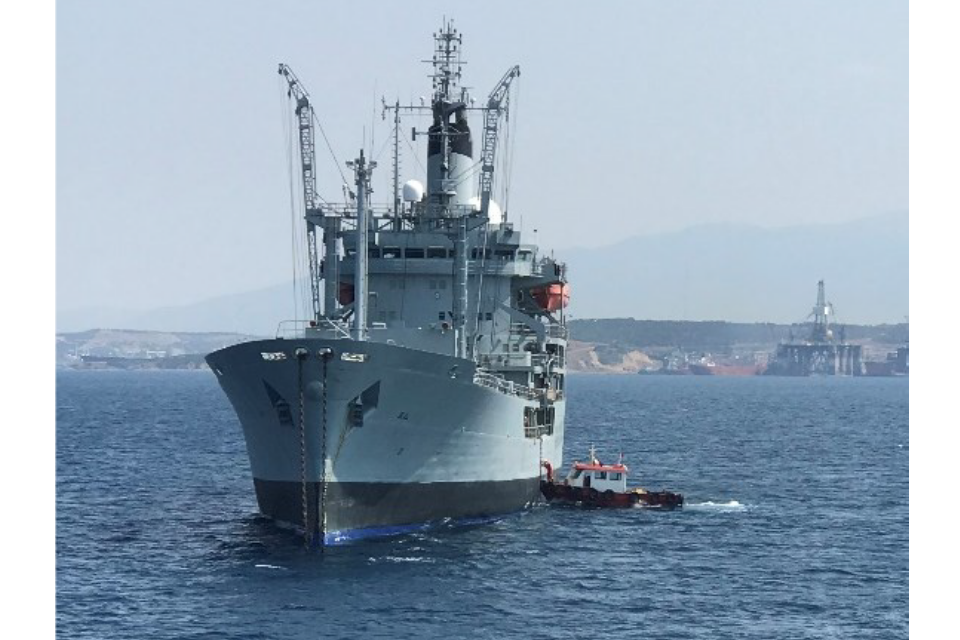
On the 1 September 2019, the Former Black Rover arrived safety at SOK’s Recycling yard in Aliaga Turkey under the tow of the tug Amber II. MOD Crown Copyright, All rights reserved.
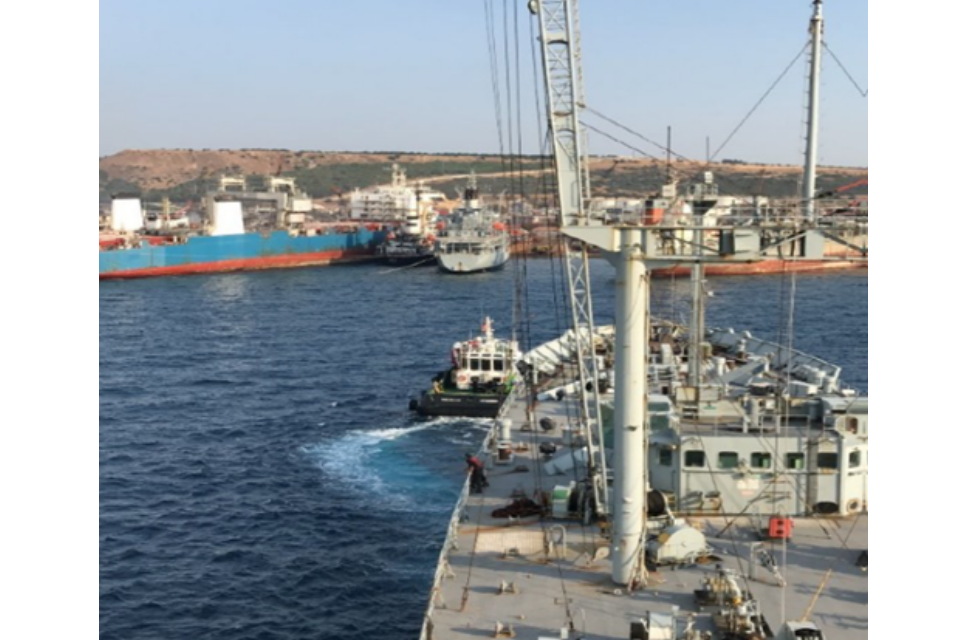
On the 3 September 2019, the former Gold Rover arrived safely at the SOK’s Recycling yard in Aliaga Turkey under the tow of the tug Opal. MOD Crown Copyright, All rights reserved.
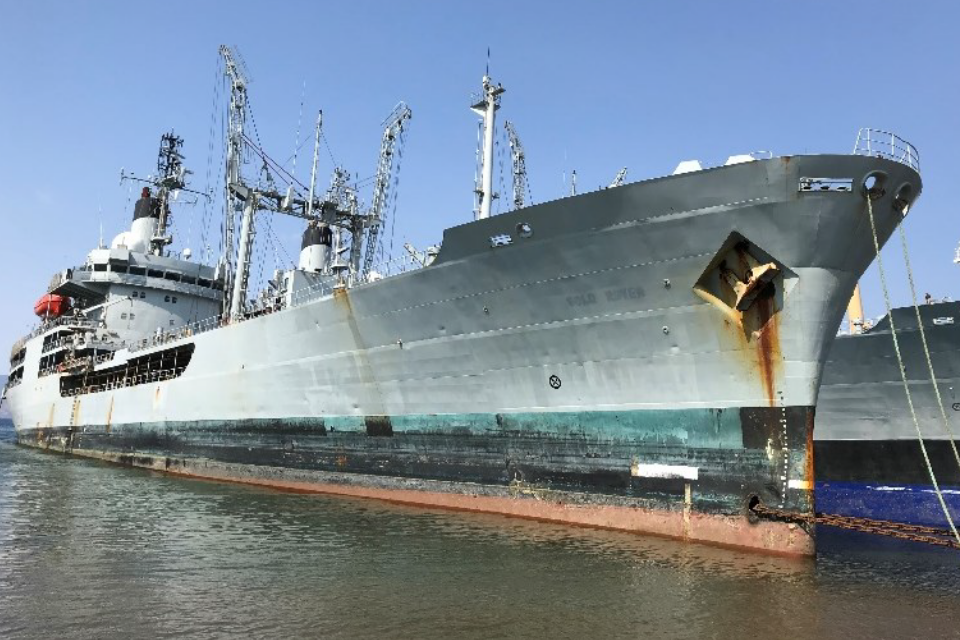
Operations completed, both Rovers arrived at ship recycling yard safely. MOD Crown Copyright, All rights reserved.
Recycling of Former Gold and Black Rover
Even once the vessels have arrived at the recycling yard DESA’s work continues as it is our responsibility to ensure that the dismantling of the vessels are carried out as per the recyclers Ship Recycling Plan (SRP) detailed in their tender and as per the ITT requirement. The recycler also provided DESA with a monthly report which included an outturn of metals and waste, photos for each stage of the dismantling schedule.
Site inspections of SÖK Denizcilik ve Ticaret Ltd STI yard were conducted by DESA staff during the life of the project, which involved checking the information provided in the monthly reports against the original data held such as weighbridge tickets, licences and consignment notes. Also taking our own photographic evidence of progress made.
Photographic evidence was also provided at key stages of the dismantling process, which ensured that the DESA could be confident on the method and manner in which the Vessels were dismantled and recycled in accordance with the aims of the SRS.
Photographic evidence
The photographic evidence shows the dismantling progress, and these coincide with the monthly reports, Demo Schedule and the sales progress received from the recycler.
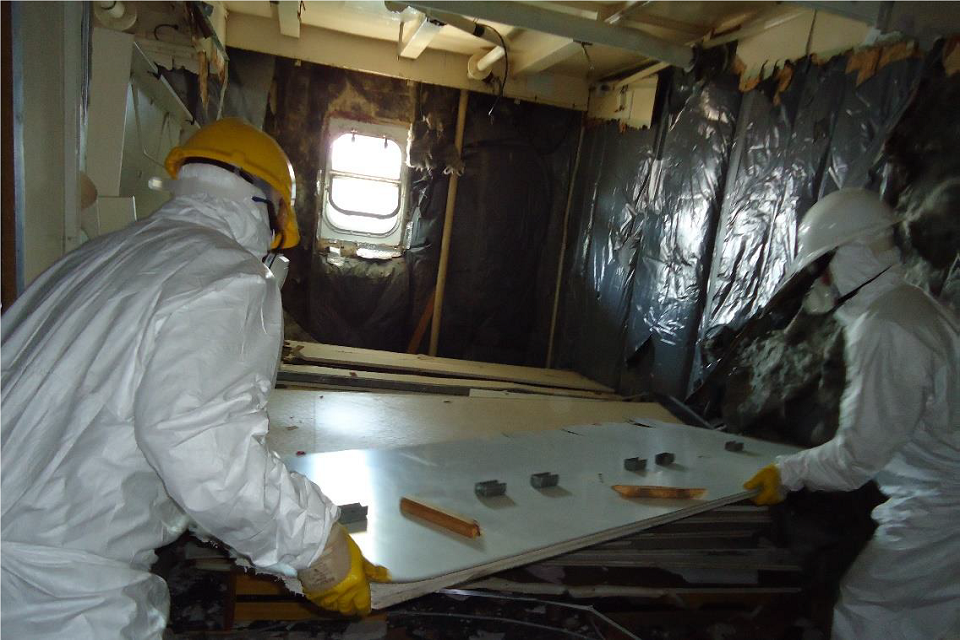
Two people working on the dismantling the ship. MOD Crown Copyright, All rights reserved.
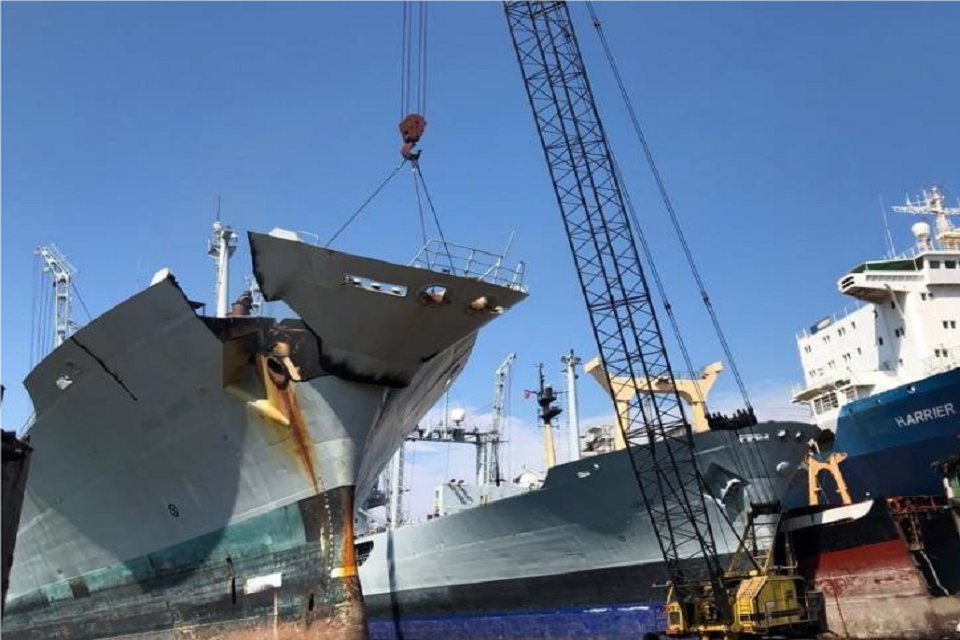
Removing the front of the ship with a crane. MOD Crown Copyright, All rights reserved.
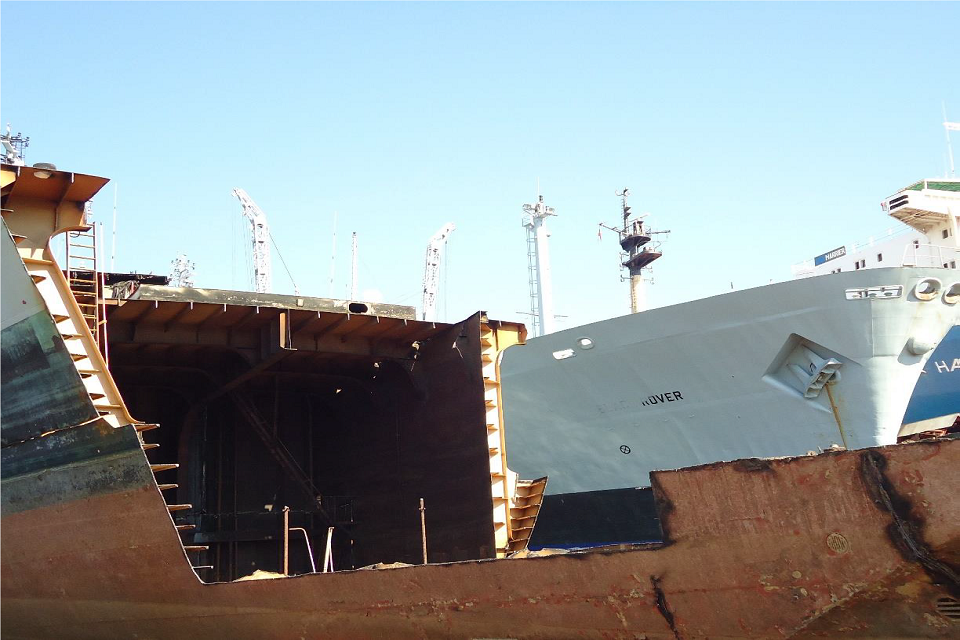
Top and sides of the ship removed. MOD Crown Copyright, All rights reserved.
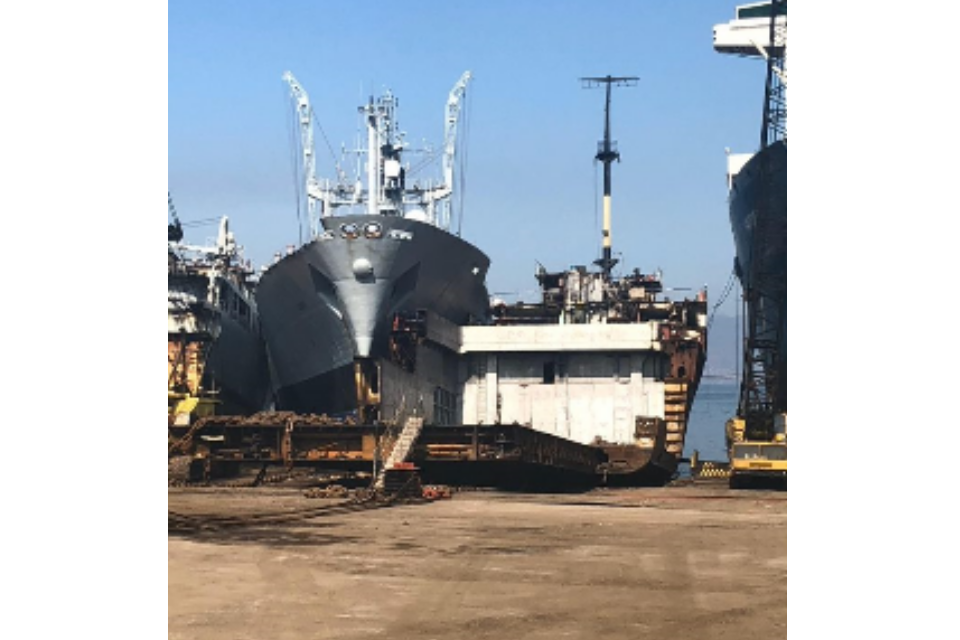
Deck of the ship exposed .MOD Crown Copyright, All rights reserved.
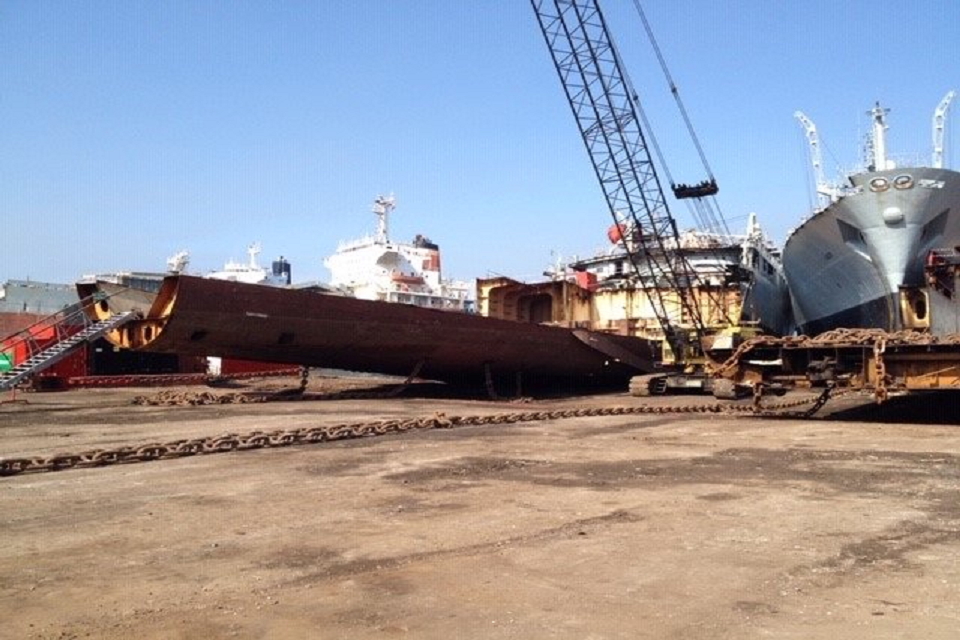
Ship completely dismantled with just the deck remaining. MOD Crown Copyright, All rights reserved.
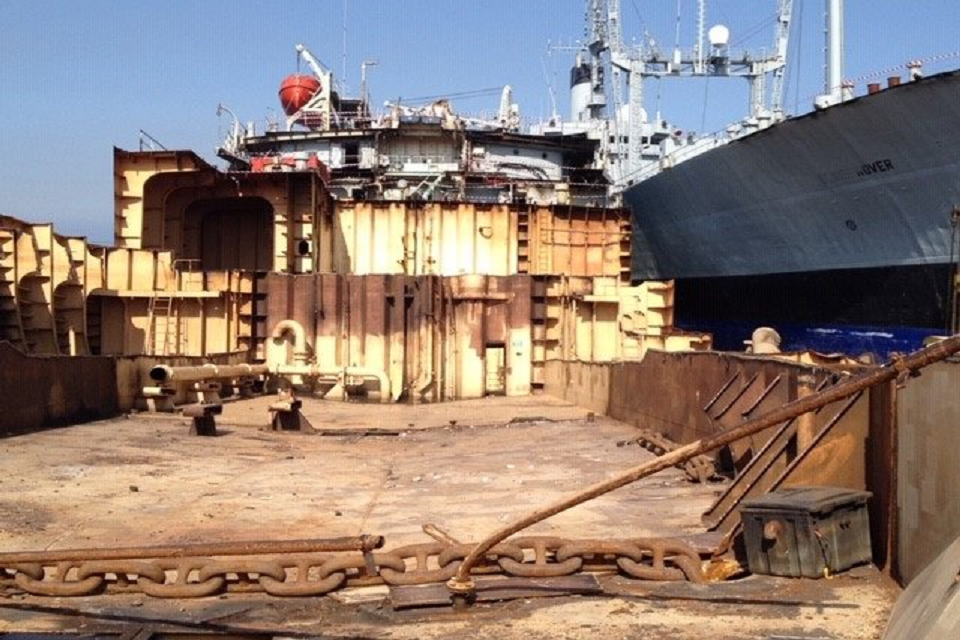
Close up of the exposed deck onboard the ship.
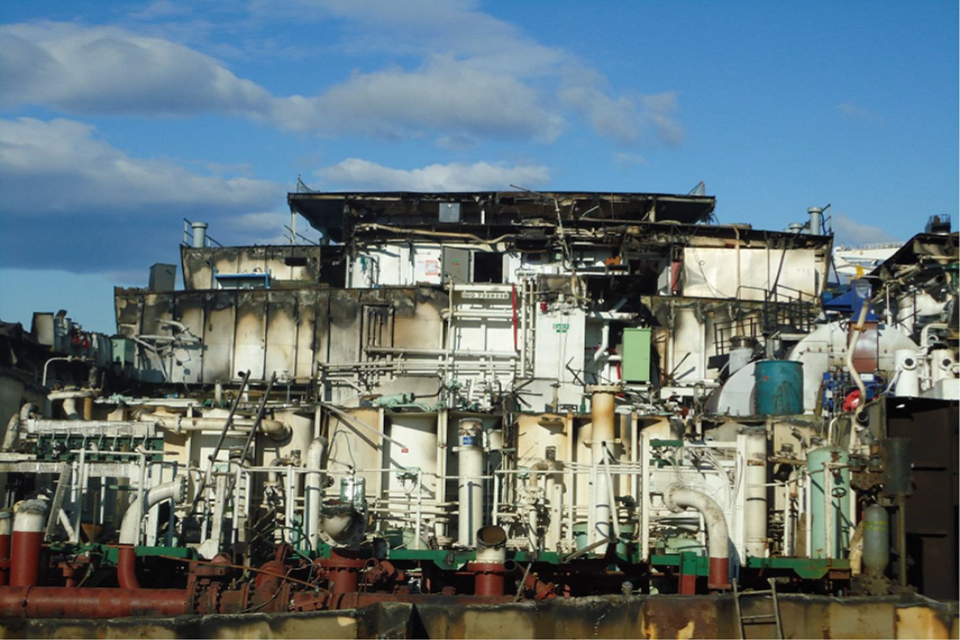
Rear of the ship mechanics. MOD Crown Copyright, All rights reserved.
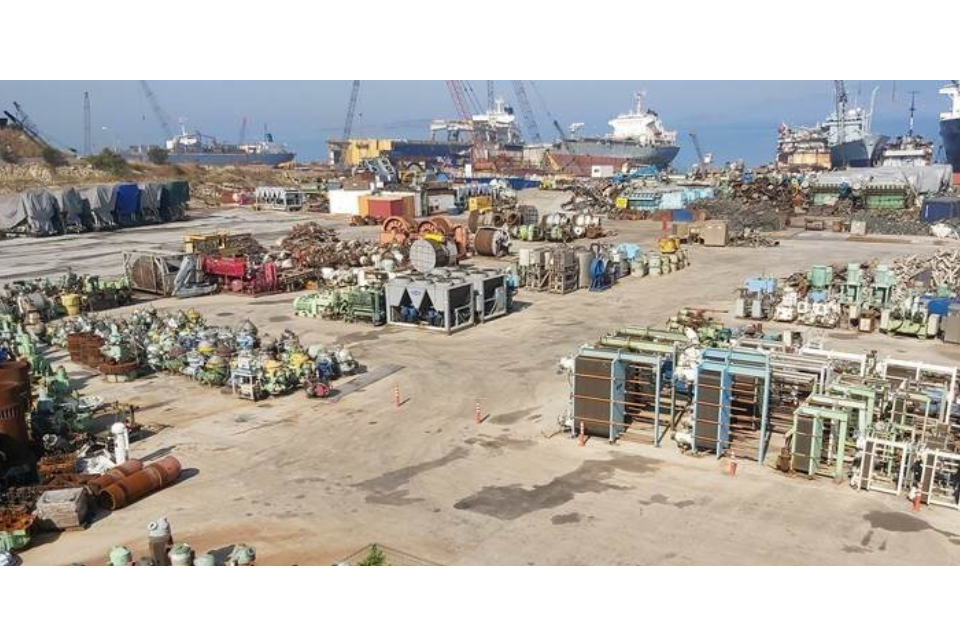
View of the recycling yard. MOD Crown Copyright, All rights reserved.
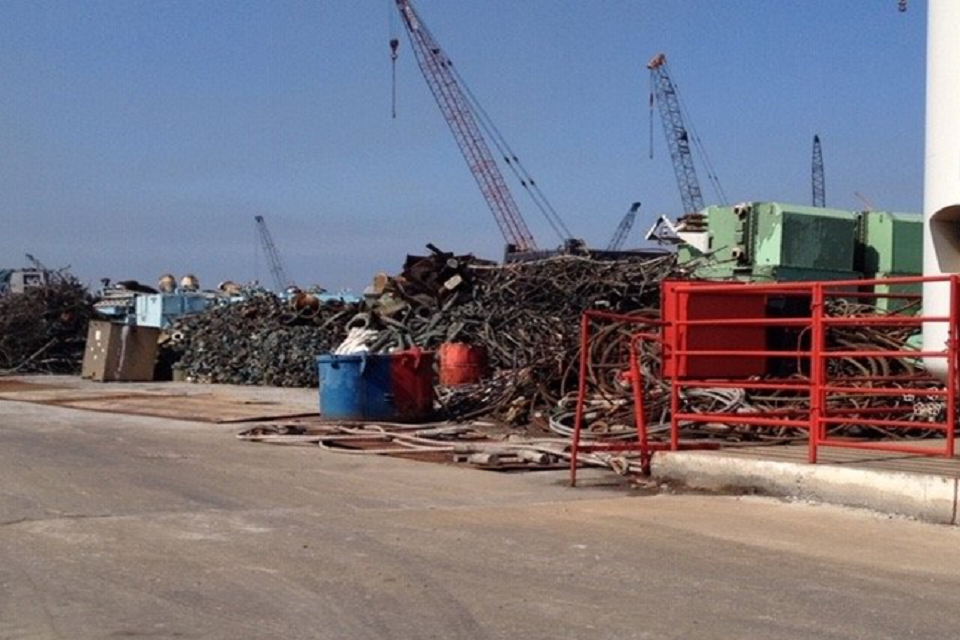
Ship parts that have been removed when the ships have been dismantled. MOD Crown Copyright, All rights reserved.
Final outturn
A detailed outturn of materials (ferrous, non-ferrous, plastics, asbestos, oils etc.) is recorded by the company and this information is communicated to the DESA on a monthly basis, with hard copies available for inspection during the regular visits by DESA personnel.
A summary of this information made by SOK Ship Recycling to the DESA is presented in the tables below.
| (All figures in Tonnes) | Expected | Actual | Destination |
|---|---|---|---|
| Ferrous Metals | 8.250 | 7.938.640 | Recycled |
| Non-Ferrous Metals | 200 | 150.520 | Recycled |
| Cables | 60 | 40.380 | Recycled |
| Other Products | 100 | 111.980 | Sale/Recycled |
| Waste | 150 | 131.710 | Disposed |
| Total | 8.760 | 8.373.230 |
The amounts of asbestos found on board the ships were primarily as woven conduits & gaskets and in line with the expectations for a vessel of this age.
98.4% of the material was recovered and recycled from the former Black & Gold Rover with a final outturn of 8.373.230 tonnes.
The Rovers once decommissioned had continuous removals and cannibalisation to support other ships still in service.
| Final Destination | Tonnes | % age of Total |
|---|---|---|
| Sold or Recycled | 8.241.520 | 98.4% |
| Disposed | 131.710 | 1.6% |
| Totals | 8.373.230 | 100% |
The prevailing regulation on Waste Management of Turkey entered into force on 2nd April 2015. This regulation based on European legal texts (namely, Directive No. 2008/98/EC and Decision No. 2000/532/EC), aiming for synchronization of the Turkish law with the EU acquis. This regulation has abrogated three previously valid Turkish regulations and unified them in a single legal framework, according to the EU waste framework. Turkey, in its continuous efforts to improve its standards regarding Environmental management, has launched an extensive accession program that has been implemented in co-operation with the European Commission. Turkey being an OECD Member, an EU Member candidate and party to major international conventions (such as The Basel Convention, The Stockholm Convention and the Rotterdam Convention) has established a robust legal framework and industrial infrastructure that is broadly equivalent to relevant international and EU standards.
While the vast majority of the materials originating from the dismantling process are recycled/recovered (98.4%), the operation also yields a small fraction of non-hazardous and hazardous wastes streams. These materials are identified, removed, handled and temporarily stored with the support of the Ship Recyclers’ Association of Turkey, which is an organization specifically licensed for this activity by the Ministry of Environment and Urban Planning and the Ministry of Transportation, Maritime Affairs and Communications of Turkey (i.e. the two competent authorities in Turkey regarding this recycling and waste management). At the same time the final disposal of wastes is done by specialized waste facilities which are also licensed for certain waste disposal methods and accepting corresponding waste categories. Both the DESA and the Environment Agency (EA) of the UK review the proposed waste disposal routes in Turkey prior to granting permission for the export of the vessel, with the process being controlled by the EA of the UK under the TFS waste shipment regulation (European Regulation (EC) No.1257/2013) pre-informed consent export procedure.
| The main waste recovery and disposal methods utilized in relation to ship recycling in Turkey | Materials | Weight |
|---|---|---|
| D1/D5: Regular/Industrial engineered Landfill | Asbestos, Insulating Materials, Remnant Waste, General wastes & recyclables | 96.340 Tonnes |
| D10: Incineration at high temperature for disposal | Fluorescent lamps & Lights | <1 Tonnes |
| R1: Incineration for power generation | Fuel/Oils(liquids) | 33.880 Tonnes |
| R4: Metal reclamation/separation | Metal reclamation, including Electric & electronic waste, Batteries & Cables containing hazardous insulation | 8.129.540 Tonnes |
The Waste related activities classed as (R) or disposal (D) is defined in the EU Waste Framework Directive 2008/98.
Conclusion
on 20 January 2020 with 98.4% of the Ships being sold or recycled.
DESA undertook 2 site inspections during the dismantling process which was completed relatively quickly due largely to the fact that the ships construction was simple for dismantling with large spaces and limited accommodation.
DESA have now successfully conducted the sale of 32 ships for Recycling, which all have complied with all international agreements and principles concerning environmentally sound management of waste.
The report will be sent out to senior internal stakeholders and a number of other foreign Governments as they view the UK MOD DESA as the lead when it comes to recycling warships.
The report can be found on the DESA website on GOV.UK.
Copyright
The Photographs included in this publication are the property of the MOD and may only be distributed and communicated further following written consent.
The publication is distributed free of charge and made available to readers outside the MOD, including those in the defence industries. The editor takes care to ensure all material produced is accurate.
